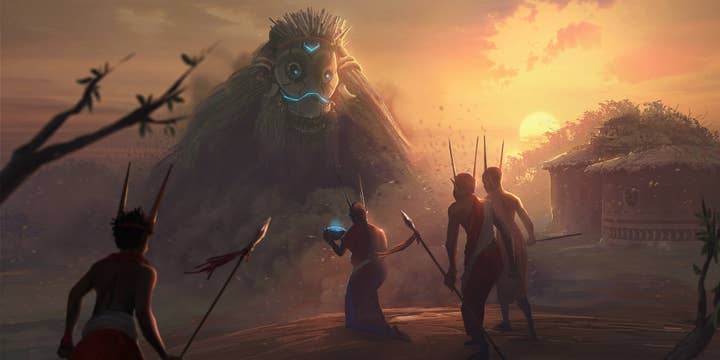How viral marketing and cultural history propelled The Wagadu Chronicles
At Develop:Brighton, Twin Drums' Allan Cudicio gave an overview of his strategies to gain traction with the studio's Afro-fantasy MMORPG
Understanding how to gather interest for your game ahead of launch is a prime topic at every Develop:Brighton.
And at this year's edition of the conference, Twin Drums' founder and creative director Allan Cudicio delivered an inspiring example based on the studio's journey so far with Afro-fantasy MMORPG The Wagadu Chronicles, which has garnered interest in particular since a viral Twitter thread in January 2020.
"There are so many games out there, Steam every year is worse," Cudicio started. "That's why it's really important to think about traction before your game comes out. It's important to think about B2B as well. So not just customers, but also publishers, investors and other additional organisations you are going to be working with. That's something I started thinking of very early and it paid off."
In a talk entitled 'Getting Traction for Your Game Before Release (Indie Edition)', Cudicio focused on what he considered three key aspects of the question:
- Doing things early
- Doing things cheap
- Doing things that align with your values
"[The Wagadu Chronicles] is an African-inspired fantasy sandbox MMORPG, so you travel through this African-inspired world, doing what you could call life skills: farming, fishing, crafting," Cudicio explained. "It also has combat, mostly PVE, inspired by single player turn-based RPGs. Community is very important. Every village you see in The Wagadu Chronicles has been created, nurtured and expanded by communal efforts, which again is inspired by traditions of the continent.
"In some way, you could say that The Wagadu Chronicles is Eve Online's economy, freedom and open wealth, with the role playing and fantasy of traditional tabletop RPGs, but immersed in a Black, queer positive source."
"This is a very personal project and I think that's something that really helps when you're trying to gain traction"
The Wagadu Chronicles has gone through a very successful Kickstarter, raised funds twice, and received a grant from the German government. The title's second playable alpha is going live this August and Twin Drums is currently actively looking for a publisher ahead of a release planned for next year.
"This is a very personal project and I think that's something that really helps when you're trying to gain traction, to get [new] hires, to get potential players, publishers, money: it really makes sense to do something that's very personal," Cudicio said.
"For me, that meant looking back at my career realising how hard I had to fight just to get some Black characters in the games I was working on, or to get the artists to have an African-inspired setting and not the 40th European, French/Venetian inspired setting. It was very much a personal fight I had to go through.
"[But] it's very much a business as well. So, in that spectrum, you have to decide early on: is this going to be just a work of pure personal art? Is it going to be business? Is it going to be both? For me, this is both. So I'm also thinking about profitability, that's why gaining traction is something I thought about very early on."
Cudicio mentioned that from the beginning he identified risk factors linked to The Wagadu Chronicles, which only led to more planning to answer the question: "How am I going to get people, potentially stakeholders, interested in this?"
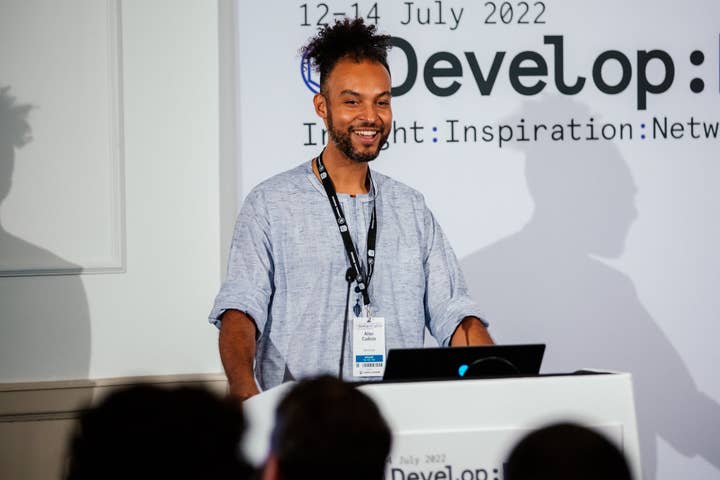
Have pre-production plans
Doing things early was the first pillar of Cudicio's plan to get traction, which for him translated into a lot of pre-production work.
"Before you start anything, just thinking, doing a ton of research, writing things down, documentation, is really helpful," he said. "I've worked in teams that had a good pre-production culture and some that didn't, and you can guess which ones were more successful."
Through that research, you should be able to identify whether there's space and interest for your project in the market. This can be as simple as looking at Google Trends, and comparing keywords linked to your title.
"I've worked in teams that had a good pre-production culture and some that didn't, and you can guess which ones were more successful"
To that effect, Cudicio focused on two aspects of The Wagadu Chronicles and how they were going to influence traction efforts:
- Mechanics: how is the game going to be?
- The IP, so in this case the world's Afro-fantasy setting and how to get people interested in it.
"Regarding mechanics, one thing that was very powerful for me was this bridge between video games and tabletop role players," Cudicio said. "There's such an interesting overlap, [which] for me was an interesting niche.
"And then the other one is of course African-inspired IPs. I think books are quite ahead of the curve, movies are getting there -- The Woman King was recently announced and the video went viral on YouTube. Three years ago this was the very beginning, but there were some good signs [about] these two elements.
"So pre-production wise, do a lot of research, look at trends and data to be able to say: it's personal, I love it, but also, there is some traction there and I can build upon it."
Thinking about an elevator pitch really early on can also help to identify what you want to communicate about your game.
Game development is marketing
Past the pre-production plans, marketing efforts should be at the forefront of your thoughts, with Cudicio mentioning that newsletters with calls to action were a cornerstone of his strategy.
"The whole process of game development is very much marketing as well," he added. "Marketing and game dev should be the same thing. I think there's a problem when you distinguish them.
"I was always thinking, when the team was building things, [about] how we're going to show them. Because in the end the game is for others, it's not for myself, it's for an audience, which automatically means marketing."
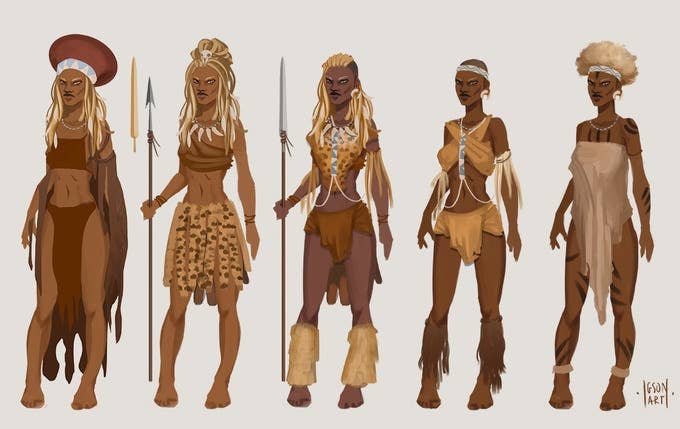
1. Social media
Twin Drums' marketing approach first focused on social media, with Cudicio saying that the studio's social media's strategy "started almost before the game itself."
He highlighted the importance for indies to pick channels to prioritise, explaining how he became "close to burnout" with Discord for instance. The 'always on' aspect of Discord is not always sustainable for small teams, as was mentioned by other Develop:Brighton speakers in a talk about community building.
"Twitter ended up being our main platform, together with Instagram. This is a really important [point] because I've seen lots of other indies trying to do everything. But there's also a big topic of doing what you're comfortable with. We did some Reddit, for instance, but as a Black gay man, it was just terrifying. It worked okay, we did some things there, but I just decided: you know what, I just want to sleep at night.
"So, again, personal and business is always a balance, and as an indie you have to find what works for you."
"There's also a big topic of doing what you're comfortable with. We did some Reddit but as a Black gay man, it was just terrifying"
Cudicio joked that "people love when you give things" and that Twitter works very well for sharing knowledge in particular, so he thought about what he could share that would also get the game some attention.
"I spend a lot of time sharing the research I was doing to create the world of The Wagadu Chronicles," he said. "Due to the global history of colonialism, a lot of the history, knowledge, cultures and traditions of the Black diaspora, and of course the continent, has been destroyed.
"It was very difficult to find. It was very hidden. So I kept on finding all these gems and thinking 'Okay, I need to share this with the world'.And let me combine it to gain traction on social media."
Two examples would be Cudicio's successful threads about queerness across the African continent, and writing systems across the continent, among many others.
"This was kind of warming up people, starting to get [us] some traction," he added. "And then eventually, once I felt that we were ready enough, I did the big thread about the setting. There wasn't a game yet but there was concept [art] talking about the lore, the mechanics, and this went super viral."
Cudicio recommended having concept art done very early on so you can share it on social media, and reminded studios that they shouldn't be afraid of open development and showing work in progress.
For Twin Drums, this newfound Twitter fame also helped them connect with prominent members of the D&D community, which further advanced the game's popularity.
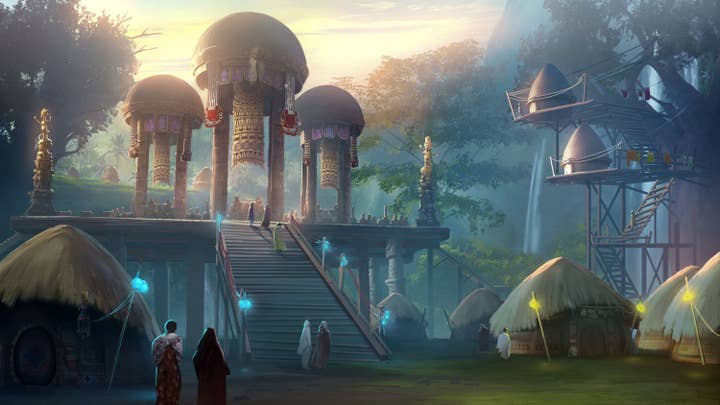
2. Kickstarter
Once The Wagadu Chronicles had gathered a healthy amount of interest on social media, Twin Drums started working towards the next step: the Kickstarter campaign, which ended up raising just shy of $200,000.
Ahead of starting the campaign, Twin Drums thought about ways to gather the role-playing, fantasy-loving community behind the project. Most studios would release a demo, but that's a difficult feat for an online MMORPG, so instead Twin Drums wrote a 300-page book featuring a D&D adventure and the whole lore of The Wagadu Chronicles, demonstrating the importance of understanding what your audience is after.
"All of the research was [transferred] into a D&D ruleset, then we made this available for free and said 'Hey we have a Kickstarter in a few weeks, please follow us, get this book for free, join our newsletter' and so on. [It] got downloaded over a hundred times, which was super successful, and many people got interested in the setting."
Another thing that Twin Drums made sure to do before the Kickstarter was to show themselves as individuals. People give money to people, not companies, with Cuducio adding that it was important for them to show the diversity and values of the team.
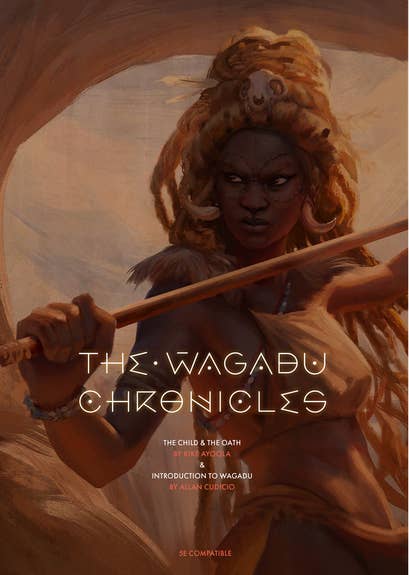
"We wanted to make people aware that we are really led by our values," Cudicio said, later adding: "An interesting sign is that on top of the Twitter of the game, we also got almost 3,500 [new] followers for the company Twitter, and we don't have any other game! [That's] because they also want to know about the company, what we're doing."
This also means being open about the game's values and what it stands for.
"The game is political," Cudicio continued. "Too often we hear in our industry 'We don't do politics', which is fascinating. It's better to embrace what politics you have and for us it's anti-colonial, it's feminist, it's anti-ableist. And again, I think our audience has really enjoyed this frankness and is behind those values."
Finally, ahead of your Kickstarter, don't forget to explore more traditional marketing routes such as pitching to games publications.
"The press is not dead," Cudicio smiled. "And it was worth making an effort to get in touch. We got a lot of money and visibility just from one article [from The Verge] and for us it was crucial. [The press] is still relevant even in this streamer/influencer age."
Finally, track any key performance indicators, every step of the way, as they will always come handy.
3. Fundraising
Being active on social media, showcasing your values, and being upfront about what ideals your game defends might pay off in more ways that you think. For Twin Drums, that took the form of a nearly €700,000 federal grant from the German government.
"Having everything we did before on social media, talking about politics, colonialism, really helped," Cudicio said. "Germany has just started giving back some of the stolen art from the African continent and paying some reparations, for instance to Namibia. We didn't know this at the beginning but then later on it paid off, just being so open about [our values]."
"Having everything we did on social media, talking about politics, colonialism, really helped"
Twin Drums also benefited from grants from Riot Games as part of its Underrepresented Founders program, which again came about thanks to the studio's marketing efforts.
"I got in touch with [Riot] through the lore book actually, because some of them had seen it," Cudicio explained. One thing leading to another, he ended up running a D&D game for Riot employees.
"So the one takeaway from the talk is to play more D&D," he laughed.
He continued: "Moving to the next step, it has been really really important for us to get players eventually to play the game and connect with it. As I said, a demo was difficult because it's an online game. But we had a bunch of backers because of the Kickstarter, and then we added some alpha testers and managed at the beginning of this year to have a first alpha running.
"And this is also because people who are already committed to the game are very interested, they know the lore, and that again has helped us to get KPIs and numbers, and gain some traction. Always try to connect the dots."
Concluding his talk, Cudicio reminded indies to always think about sustainability in the long term, in financial terms but also in terms of your workload and creating the right balance for your team.
"The journey hasn't ended," he continued. "The release of the game is next year. One big takeaway is that everything is connected and builds upon each other.
"And even looking out the next alpha, the beta, the current talks with publishers and investors, traction has really helped. And this has been from pre-production until today and I can only recommend it."
"The one takeaway from the talk is to play more D&D"
He concluded: "And then I want to use a gen-Z word: manifesting. I think it's good to try manifesting things. What does it look like? It's not on Steam yet but I'm manifesting it, closing my eyes, seeing how the Steam page is going to look like and eventually visualising all of the wishlists that are going to be there.
"Apart from being a good mental exercise, it's actually useful because it helps you imagine what are the keywords you're going to use, how you're going to pitch it, how to communicate it, two or three years in advance."
More GamesIndustry.biz Academy guides to Selling Games
Our guides to making money from video games cover various aspects of the publishing process, whether you're a young game developer about to start a new project or an industry veteran:
